Graham Reid | | 14 min read
Reptile (from Starfish)
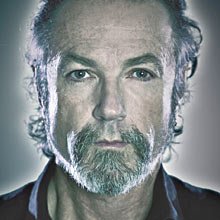
Whoever first said it, someone probably centuries ago, doesn't matter because the essential truth of it holds true: Be careful what you wish for because you might just get it.
In popular music the wish is often that Big Hit which can lift a band or artist from the wings and place them on centre-stage where those things they've yearned for – money, fame and acclaim – all follow.
But having that wished-for hit can bring with it as many curses as blessings.
Just ask Steve Kilbey, the founder, bassist, singer and songwriter in Australia's long-running band the Church. They are at Auckland's Town Hall on December 4 playing their '88 album Starfish – which included the Kilbey/Church classic Under the Milky Way – in its entirety as well as a selection of their other great songs including, no doubt, their first hit The Unguarded Moment from '81.
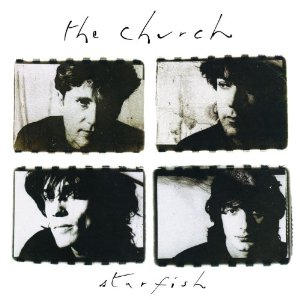 Each of those two hits – Unguarded Moment at the start of their career and which saw them lumped in with the jangle-pop of the Paisley Underground movement, Milky Way a jolt after some well-received but modest selling albums – came with a price which Kilbey, on a quick promo-visit to Auckland, can laugh about now . . . but still allows himself to feel the stings they brought.
Each of those two hits – Unguarded Moment at the start of their career and which saw them lumped in with the jangle-pop of the Paisley Underground movement, Milky Way a jolt after some well-received but modest selling albums – came with a price which Kilbey, on a quick promo-visit to Auckland, can laugh about now . . . but still allows himself to feel the stings they brought.
Although our lengthy conversation begins with a discussion about Greek myths, esoteric literature, Norse gods and so much else – more about that later – let's cut to when we eventually got round to talking music, and the curse of the hit.
Under the Milky Way was the big one, the career changer, but The Unguarded Moment from their debut album Of Skins and Hearts in '81 was the one which lifted them above the pack and took off at radio.
He must have played hundreds of times in the years since?
“No, not as much as you might think. We didn't play for a long time, it went right out of the set list because it pissed me off so much. We'd go to Wollongong or places like that and the audience would be all stuck against the back wall like on some centrifugal machine.
“So I'd say stupid songs like, 'This next song based on an ancient Assyrian goat herding tune and when they played this tune all the goats would come home'. And sure enough, with no awareness of sarcasm, they all came up the front when we played and after it was over they's all go to the back again.
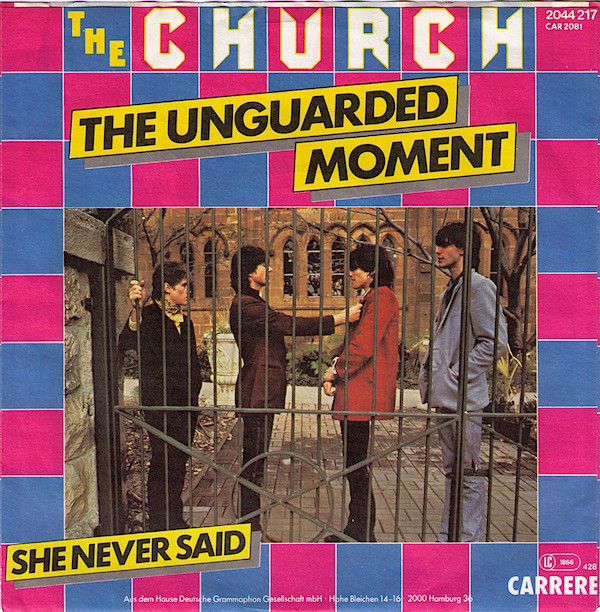 “Audiences in Sydney and Melbourne were different, but out there . . . so I resented it and said, 'We're not doing it anymore'.
“Audiences in Sydney and Melbourne were different, but out there . . . so I resented it and said, 'We're not doing it anymore'.
“But that is how it was, we were standoffish and they were standoffish.”
That said, he tells of promoters demanding they play it for an audience which might otherwise tear the venue apart if they didn't get to hear Their Hit.
“So we sometimes had to do it!”
The effect of the success of Under the Milky Way which he co-wrote with his then partner Karin Jansson and did well in the US and has been much covered since (not the least by New Zealand's Strawpeople in '94) shoved their fifth album Starfish into mainstream attention and broke them in the US where they'd previously enjoyed modest success.
Kilbey admits he was surprised when the single and album were so successful.
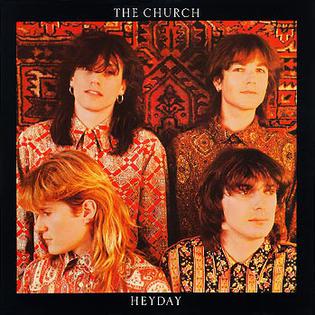 “I didn't dislike [Starfish], I though it was a good record but I didn't think we were going to have a hit out of it, and you need to have a hit to sell a lot of records. I thought it would be just another album which came out and did okay, [Its predecessor] Heyday did 60,000 in America which is a lot.
“I didn't dislike [Starfish], I though it was a good record but I didn't think we were going to have a hit out of it, and you need to have a hit to sell a lot of records. I thought it would be just another album which came out and did okay, [Its predecessor] Heyday did 60,000 in America which is a lot.
I though Starfish would do that and people would say, 'That's great, good work boys' and it would go away.
“But a hit changes everything.”
For good and ill?
“Yes, in my doco you see Karin saying, 'It was great it was a hit but there were a lot sad memories because Steven and I were never together like we were before'. It changed everything in our lives, it put me on a new level of temptation and opened more doors that maybe shouldn't have been opened . . . and made a lot of money and so we did a a lot of touring.
“It seemed like the world was a bowl of cherries for a little while.
“But saying that, the guys in the band all hated each other and they all hated me. Instead of being grateful that I'd written this song which had dragged them into the spotlight they were sort of envious and miserable about it as well.”
Those other guys were longtime Church members Marty Wilson-Piper (guitar, vocals), drummer Richard Ploog and guitarist Peter Koopes. And they were envious because they hadn't written it?
“Well, they hadn't liked it much at the time. There was this new unwritten rule that we'd all write one song each and the rest of the album we'd write together and sing on.
“I already had my one song Hotel Womb, it had been submitted and accepted, believe it or not. I had relinquished my tyranny of the band because in the beginning it was, 'I'm writing the songs, I'm saying how we are going to look, I'm saying what the album art will be, I'm saying what the video is . . . I'm saying everything we do is coming through me'.
“And I found that a high and lonely destiny and they were really treating me . . . like in Let It Be and the way McCartney treats George.
“I was the Paul telling them all what to do. Just because you write the songs and sing and can play the bass doesn't necessarily make you a good leader because that's a skill in itself, harnessing three guys who are really talented onto your vision.
“I was abrasive and rude.
“Once we were lost in Melbourne and I was driving and they said, 'Why can't you learn your way around, we all had to learn so why can't you?'
“And I said, 'Why don't you leave writing the fucking songs to me and you can do the driving' and there was silence in the car. It was like, 'Oh, he's said that!'
“There had been an illusion of democracy because on Heyday I relinquished the strings and said, 'Let's all write' and I think that was a good decision. I realised we could write better music if they were all on board. And they were all great musicians so I could feel they were ready and from then on we wrote together and I would sing on top.”
Ironically Under the Milky Way which came up late in the Starfish sessions was “a black sheep and no one really liked it and I didn't care”.
The band's manager however said it should be on the album and so it was recorded in a huge empty studio “like a basketball court” in LA using a Synclavier instead of Ploog on drums.
“When sequencing the album I wanted it second [where it ended up] but co-producer Waddy Wachtel said, 'No man, we don't want people hearing that song so soon'. He wanted to put it second to last.”
But then the record company people from Arista came in for a listening session and the label's powerful headman Clive Davis announced it as a hit “and all his henchmen shook my hand and said, 'It's a hit' and they made it a hit.”
Having already seen what a hit could do – and Almost With You six years previous had also done well – Kilbey knew what might be coming.
“Yeah, high expectation. I became quite arrogant and I would clash with [the record company people] which I have learned not to do now. I pissed a lot of them off.
“There was the expectation you could do it again and I didn't know how to do it again. Everyone thought I could write another Milky Way every few months but I didn't know how I did it then so couldn't.
“My brain doesn't like to be harnessed,” says this man who is also a poet and painter, “and if I was to try to write Milky Way again, and I never have, it would be really inferior. That isn't the way it works. Everything I come up with arrives accidentally, it's random and the conditions that song existed under no longer exist, they were just there for that one night.
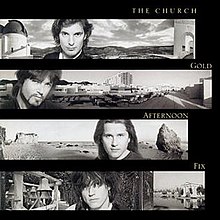 “I didn't want to write it again, I'd already done it.
“I didn't want to write it again, I'd already done it.
“That was the beginning of a bad phase for me and I'd been really happy up until then.
“It was an end of innocence and that's when the band began to show some cracks, we should have been more united and more careful but we all became more arrogant and we didn't try as hard because we felt we'd done it.”
They toured, drank, behaved badly to others and each other, sessions for the subsequent album Gold Afternoon Fix were fraught, Kilbey moved from joints to opium and heroin, drummer Ploog quit and . . .
I joke with Kilbey that while their Auckland concert celebrates the 30thanniversary of Starfish I am going to have to wait until 2022 for the similar anniversary of my favourite Church album, the sublime, opium-infused Priest=Aura. It's been a longtime Essential Elsewhere album.
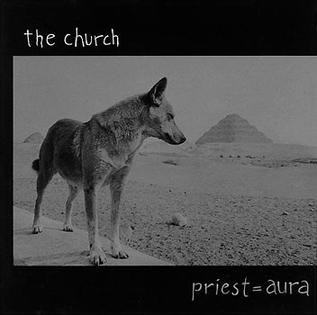 “That's my favourite Church album too. With that we had just stumbled on something and it's a terrible thing to say, and you have to understand I don't advocate taking drugs, but I was starting to take opium and heroin and was in my honeymoon period with them.
“That's my favourite Church album too. With that we had just stumbled on something and it's a terrible thing to say, and you have to understand I don't advocate taking drugs, but I was starting to take opium and heroin and was in my honeymoon period with them.
“And for my part I had a desire to recreate this feeling, which is why I was always doing things like going to bed with women, taking drugs, stupid things like driving in fast car or diving off a high board . . and I was looking for experiences to feed what I was doing, and always thinking about ti.
“So when I started using opiates for the first time in 1991, I wanted to get that languid feeling into music, I wanted to recreate that.
“It was my honeymoon phase [on heroin] and the music and words were coming easy . . . and Jay Dee Daugherty had joined from the Patti Smith Group and he was an incredible drummer. He had a lot of energy and authority which Richard never had.
“And Marty had just bought this volume pedal, which doesn't sound like much, but on the songs his part has no attack, more like the way an oboe or a flute comes in. And Peter had all these effects too and was playing through them.
“So the band just got together and the songs were just falling out of the air really easy. I had a cheap sampler which could play strings and we used loops.
“The way I work is when the band have written the music I let it percolate and the day I do the vocals is the day I write the words.”
He says he would roll joints laced with opiates and let the feelings and words flow through him.
“It was illegal stupid stuff but like Rimbaud said, a poet must derange his senses in all the ways he can.
“I get that, I was deranging my senses to find the other side and I broke through and for the first time ever the lyrics were coming through me, being written down so fast, it was like a transmission coming out of nowhere.
“I was in this marvelous creative place, and it's like widescreen music. It was my attempt at reconciling history and drugs and sex and rock'n'roll and the Bible and the myths and life and death . . . Get it all into each song and tackle the big issues with all these literary allusions and clues. Pack it full of detail so people can listen to it forever.”
But eventually it all came at a price when the dream state turned into a nightmare of addiction.
“It was like having a horse and stabbing it to win the race. It might win but the horse isn't going to survive. So I had this six month honeymoon period and paid for it for the next nine years, writing songs despite heroin not because of it.”
The reward for Kilbey, the Church and listeners was an album which has depth and longevity, a timeless album from somewhere else in the cosmos. It is an album which, like opium, is enveloping, warm and relaxing.
Ironically it was one of their least commercially successful releases.
“The other thing with Priest=Aura is that we had at last shucked off our influences and it is pure Church, No one else could have made it, none of the songs on that album sound like anybody else.
“We made that most amazing album and we've struggled to recreate it and even now when we are doing things someone might say, 'This sounds like Priest' and we think, 'Yay!'
“But even if someone sat me down and gave me a million dollars and said, 'Do Priest Part II' I wouldn't know how to do it. It was just that moment.
“After Heyday we really came back with Priest=Aura, but it was too late and the focus had moved away and grunge was everywhere. It made us seem obsolete overnight.
“It was the most anti-grunge album, full of European ideas with hi-falutin' language and a beautiful attention to detail.”
Although the Church is a huge part of his creative life Kilbey -- who has written over 700 songs, has side projects, paints and writes a poetic blog – is a man who has had a long abiding interest in esoteric literature, religion, myths and the spiritual world.
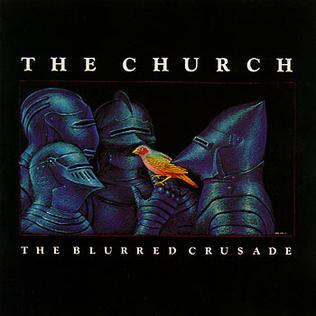 For fully two thirds of our conversation these topics are what we talk about: a shared interest in writers like PD Ouspensy and Gurdjieff, Norse myths (he lived in Stockholm for three years) and Lewis Carroll . . .
For fully two thirds of our conversation these topics are what we talk about: a shared interest in writers like PD Ouspensy and Gurdjieff, Norse myths (he lived in Stockholm for three years) and Lewis Carroll . . .
These things, to a greater or lesser extent, have fed into his lyrics (When You Were Mine on The Blurred Crusade album of '82 for example alludes to previous lives) and appear in his paintings The interest began when he was very young.
“When I was four my mother read me Alice in Wonderland then Through the Looking Glass, a chapter each night, and with my impressionable mind I seized on that and later if they bought me a book about cowboys I said, 'No I don't want that'.
 “I wanted magic and illusion and tricky time shifts. And then when I was still young I got into Greek gods and goddesses, the myths and legends and read children's versions of The Iliad and The Odyssey. There was a brilliant [British] woman called Rosemary Sutcliff who would take those Greek myths and Nordic myths, and Celtic ones as well, and she would rechannel them for children, still with all their brutality, but in a language that a kid of 11 would understand.
“I wanted magic and illusion and tricky time shifts. And then when I was still young I got into Greek gods and goddesses, the myths and legends and read children's versions of The Iliad and The Odyssey. There was a brilliant [British] woman called Rosemary Sutcliff who would take those Greek myths and Nordic myths, and Celtic ones as well, and she would rechannel them for children, still with all their brutality, but in a language that a kid of 11 would understand.
“I understood something beyond this dimension. In my hankering for music, books, art and films I demanded the supernatural, so if there wasn't something of that happening I probably wouldn't be interested
“As far as my own belief in God and those things, I now very much believe in God and the supernatural, I believe there is life outside this planet, that there is so much more going on than just here.
“I believe in reincarnation.”
And to some extent Fate, as when he speaks about meeting Karin: “The Church had gone and partied with this all-girl band and I hadn't been part of it and I walked into this hotel and Karin was sitting there and we just saw each other and went 'Bang!'.
“We didn't fall in love but were just looking at each other and were laughing and talking, and joking about how we were going to have twins. And we did.
“It was like Fate or it had happened before.”
Not that all these belief and interests necessarily get anyone other than the most enlightened through the mundanities of life and record company politics, band arguments, relationships going sour or even someone just standing on your foot in a train.
“You know what, it's part of the human condition. Once when I was getting off heroin I was in a terrible condition and I got down n my knees and prayed to the God of my understanding, couching it in NA and AA terms, not Jesus or Jehovah. But the God of my understanding was Krishna because for about five or six years I'd been devouring the Mahabharata and Bhagavad Gita, the Upanishads and various talks the Buddha had given.
“On every level I was in agony and was used up and finished and trying to get off heroin because I had an enormous habit. In every way I was destroyed and so I prayed and for the first and only time in my life God came and I experienced what it was like, yet even having had all of that, knowing for sure that there is a God, I'm still bitching about, 'Why has he got a better room than me?' and 'I want an ensuite',” he laughs.
“I'm still like an idiot and that one glimpse probably wasn't enough!”
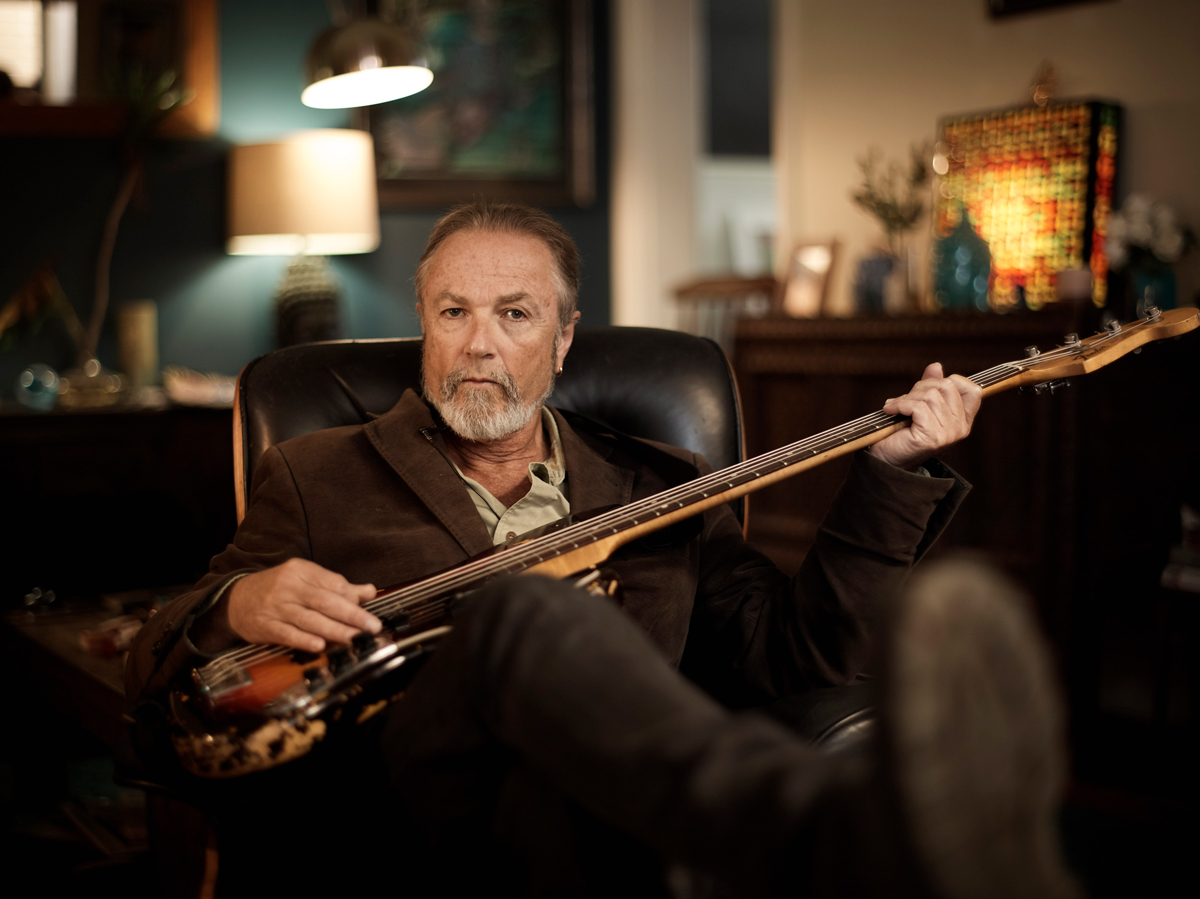 He talks of figures in the Bible like Jonah being shown the way but straying, of the temptations which emerge to distract yogis from the search for enlightenment.
He talks of figures in the Bible like Jonah being shown the way but straying, of the temptations which emerge to distract yogis from the search for enlightenment.
“You think once you are illuminated that you are illuminated [forever] but it is so easy to fall back down to the mundane.
“So when the band has a fight and someone says, 'Kilbey, you're a cunt' it's not like, 'Oh I have God'. I'm like everybody else, I have a thin skin. I keep getting sucked in by the things that men like.
“If you saw that doco about George Harrison, Paul McCartney kept saying, 'the thing with George was he liked the things blokes like'.
“I like those things, whatever that means, but it is very hard.”
And after a digression into how Hollywood has destroyed the Greek myths with films like Troy which ignore the role of the Gods, Ouspenky's experiments with ether, a funny story about a terrible concert in Christchurch which has become urban legends and more, the idea of reincarnation takes us to a funny conclusion.
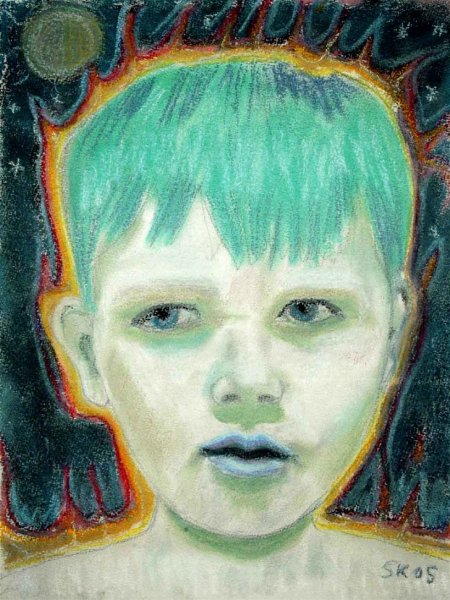 I tell him of Ouspensky's only novel, The Strange Life of Ivan Osokin, in which the main character is given the chance to go back and live his life over again (it's a story explaining deja-vu) to avoid the mistakes he made.
I tell him of Ouspensky's only novel, The Strange Life of Ivan Osokin, in which the main character is given the chance to go back and live his life over again (it's a story explaining deja-vu) to avoid the mistakes he made.
“That's another paradox: when I was 16 I wish I could do what I do now, do what I do on bass, paint how I paint, talk how I talk . . . and now I have all these things I have acquired and that makes me mad about dying and having to be reborn, having to fucking learn all this stuff again.
“I knew I'd always been a musician and it was so frustrating having to start again,” he laughs.
Marty Wilson-Piper, now no longer in the Church, was interviewed here in 1994. There is also an earlier interview with Steve Kilbey here.
Steve Kilbey's extensive website of art, music and more is here.
THE CHURCH; STARFISH 30th ANNIVERSARY TOUR
AUCKLAND TOWN HALL, TUESDAY DECEMBER 4
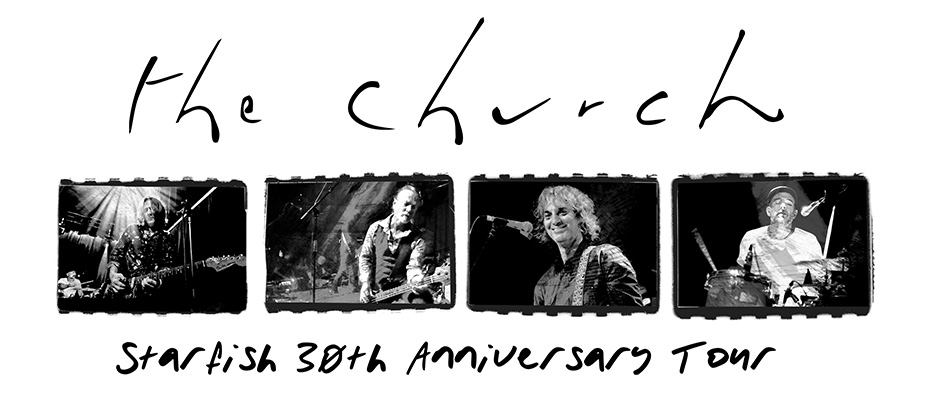

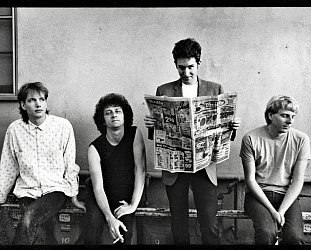

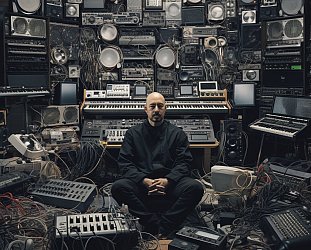
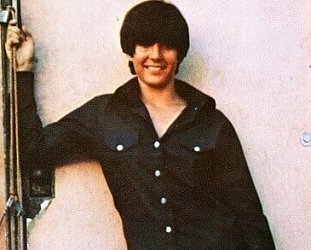
post a comment